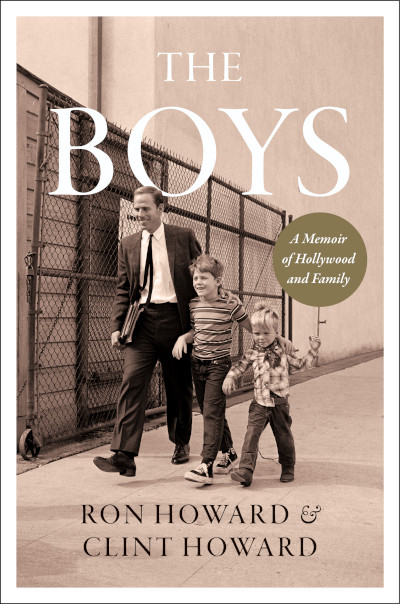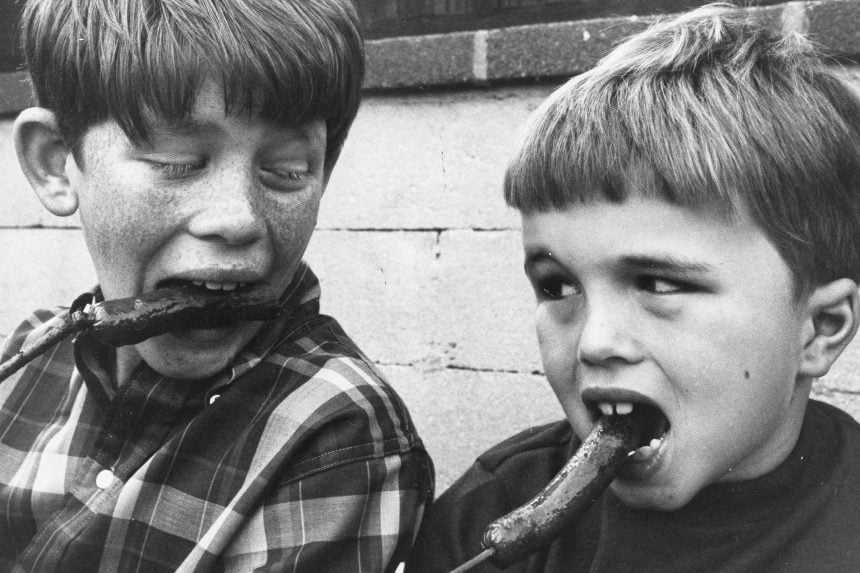America watched Ron and Clint Howard grow up on TV. They were just kids when Ron became a household name playing Opie Taylor on The Andy Griffith Show, while Clint shared the screen with a lovable bear on Gentle Ben. In their new joint memoir The Boys, the brothers lift the lid on their private lives, revealing the challenges they faced as they navigated the tough Hollywood world.
Ron left his acting career behind to become one of Hollywood’s most successful directors, scoring Academy Awards and big box-office success with films like A Beautiful Mind, Apollo 13, Cocoon, and Splash. Clint made his mark as an actor in TV series and films, including more than a few that were directed by his brother. They both write frankly and honestly about the journey they’ve shared.

Jeanne Wolf: Telling your story about growing up together, we expect to hear about conflict and sibling rivalry. You guys have been very honest in this book, and it appears you’ve avoided that.
Clint Howard: Ron and I would tangle when we were kids over baseball cards, toys, or kid stuff. Ron, being five years older, had a distinct physical advantage, but that didn’t stop me from wanting to get in there and grab a piece of my big brother. Dad would pull us apart. He would say, “When you guys get older, you’re going to want to be friends. So why don’t you just knock it off?” I was always happy for Ron, but of course, I wanted a hit show too.
Ron Howard: Just so you know it was never about winning roles. Our parents never framed our first ventures into acting as competition between us. But we were competitive. Our parents were definitely setting us up to win. I don’t think there were very many auditions that either of us went on, when we were little, that we didn’t get the part. I still emphasize what they taught me on a set now — preparation, intense preparation.
JW: You have worked with some of the most famous people in screen history. Yet you both say it was your mom and dad who gave you your work ethic and sparked your acting talent.
Ron: It’s quite a gift to be able to look back at your parents and recognize their mistakes, things you would do differently, things that you may have disagreed with them about, and then be able say, “Man, I was lucky. God, thank you for allowing me to be their son.” I don’t know how they did it. Now that I have four grown kids, I don’t know how Cheryl and I did it. I like to look at my grandkids and send some of their spirit.
Clint: Both Ron and I are guilty of picking on Mom a little bit when we were young. In fact, we rode her pretty hard, especially about things like her smoking. The thing that I carry with me is her sparkle and a sense that anything’s possible. I think that optimism was her gift to Dad and to us, to sort of validate our dreams.
JW: Ron, You became wildly famous at a very young age. Yet you began to instinctively know that directing was your future.
Ron: I don’t have a performer’s personality. If I had stayed on the farm, I don’t think I would have grown up with that dream of being just an actor. But while acting on TV and movie sets I began to see what it takes to be a complete storyteller as a writer and director, to actually be responsible for everything. It still frightens me, but that goes with the territory, and I love it. I began to appreciate it as a way of life. Stories were what mattered to me. To collaborate with people from all over the world and to be at the center of shaping the story is thrilling.
Clint: I do like to entertain people. I’m probably more of an entertainer than Ron personality-wise. It’s sort of second nature to me. What I learned from Ron is “continue marching forward.” And he helped me as an actor but, contrary to what people think, he has not put me in every one of his movies, only the ones he thought I was right for. Ironically, it’s our mother who had parts in all of his films.
“As good as he is as a director, Ron is an even greater older brother.”
JW: Clint, you had a long period of time when your life and career were thrown off course by addiction. I know Ron has said he felt so guilty because he didn’t realize how much trouble you were in.
Clint: As good as he is as a director, Ron is an even greater older brother. He helped me a lot, and so did Mom and Dad. They even went to AA meetings with me. I don’t believe that becoming an addict had anything to do with my childhood. I just couldn’t wait to try to get out of myself, to escape from myself. I spent a lot of time in recovery over the years, and I saw how many people suffer from alcoholism and drug addiction, and some don’t conquer it. Now, I’m doing fine. I’ve reconnected with the Clint who didn’t need a drink, a toke, or a toot to get through the day.
Ron: As Clint got worse, I knew we couldn’t rationalize his drug use as recreational. I’d seen examples in show business of its effect on your survival. We were at Super Bowl XIV when I told him, “It’s one thing to use drugs and another to let drugs use you.” I never took anything but I did have a vivid dream that at a party I snorted some coke. I felt a euphoric rush and I said, “That’s the feeling I get every time I say ‘action’ on a film set.”
JW: It was after the death of your father that the two of you decided to write this book. What do you remember most about what he left behind?
Ron: I think the thing that I value about my dad is a kind of truth. He didn’t see the world through rose-colored glasses. What he achieved, what he didn’t achieve, what we achieved, what we didn’t achieve, he saw with such clarity. And he took me through that process a number of times during the course of my life. It was always an invitation to see things in a broader, more honest way. And that always leads, I think, to less friction and better decisions as you go along.
Clint: I can feel my dad’s hand on my shoulder. I have a couple of great burned-in memories of Dad. And it’s not what he said, it’s just the way he would put his hand on me, the way he would get me ready for an emotional ramp-up in my work or my life. Dad was always there for me. I cherish every moment that I had with him, but it was more his touch than really anything else. He was just there.
—Jeanne Wolf is the Post’s West Coast editor
This article is featured in the September/October 2021 issue of The Saturday Evening Post. Subscribe to the magazine for more art, inspiring stories, fiction, humor, and features from our archives.
Featured image: Putting on the dog: The brothers share a self-cooked meal. “What I learned from Ron is ‘Keep marching forward,’” says Clint (right). “And he helped me as an actor.” (ZUMA Press, Inc. / Alamy Stock Photo)
Become a Saturday Evening Post member and enjoy unlimited access. Subscribe now


